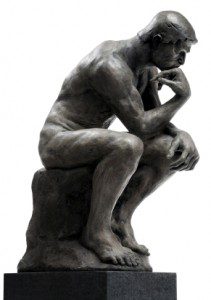 What makes someone a person and not a thing? Can such differentiation even occur? Do these questions matter, and if so, why?
What makes someone a person and not a thing? Can such differentiation even occur? Do these questions matter, and if so, why?
The differentiation of persons and things bore great significance for Martin Luther King, Jr. for matters of morality. In his estimation, moving from a culture of things to persons would help us confront well such problems as economic exploitation, racism, and militarism (Please listen here to King’s critique of the Vietnam War along such lines).
While I don’t know precisely how King would define person, I do believe seeking to differentiate persons from things proves beneficial for morality, especially in our scientific age and consumer culture in which all too often reality is reduced to material, measurable phenomena that is valued solely for economic benefits.
In my estimation, the following questions bear upon the present discussion and are bound up with seeking to differentiate persons from things. Perhaps you can think of other question. Please feel free to set forth what these questions are in the comment section.
First, is it necessary to believe in humans having souls to differentiate persons from things? Other questions arise in this context. If we maintain (as I do) that there is a soul (and that it is permanent), is the soul the mind, or is it something else, something more? Is the mind simply the brain? If the soul is the mind, and the mind is the brain, is there anything to humanity other than material reality? If there is not anything beyond material reality, is the human simply a thing? If so, then what happens to morality? What difference would it make if there were different kinds of materiality and the human soul were a certain form of materiality? And what if the soul exists, but is not permanent or immortal? How would this position bear upon the discussion?
Second, does freedom in whole or in part differentiate a person from a thing? Now if there is no such thing as freedom (however it is defined), and everything is the result of necessitating preceding factors, what would this state of affairs entail for consideration of personhood? Could we safeguard the existence of freedom or freedom of choice on some level if we appeal to concurcus or combatibilism, where necessity or determinism and freedom on some level coincide?
Third, how do the affections or passions bear upon the discussion of persons and things and moral freedom? If one were simply a mixture of blind emotions without rational engagement where one’s choices are simply the result of base passions, what would differentiate such an individual human from certain beasts? Moreover, if one were forced by passions to choose, how could one be morally responsible for one’s actions? From the other end of the spectrum, if one were only a reasoning entity without passions, would this individual be anything other than Star Trek’s Mr. Spock? What kind of human does not think in view of competing residing affections in evaluating which course of action to pursue?
Fourth, can a human truly be personal apart from other individuals? And what makes for personal relationships? Does it entail differentiating grasping from non-grasping in our engagement of others? With this last question in mind, can we also approach non-human entities such as rocks or plants or motorcycles in personal or relational ways that safeguard against objectification of things as things? Back to humans, how do contractual vs. non-contractual forms of relationship (contractual is here defined as treating fellow humans as mere means to one’s own ends or society’s ends; non-contractual is here defined as treating people as more than mere means to one’s own ends or society’s ends) bear on this discussion of differentiating persons from things?
I bet you wish I had never asked the opening question about persons and things, especially given all the questions that followed. And for those in relationship with me, perhaps you are considering dissolving the “contract” as a result of the barrage of questions? But perhaps necessitating preceding factors made me (whatever “me” is) do it. If so, how could you blame “me”?













